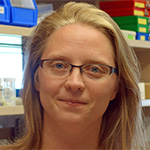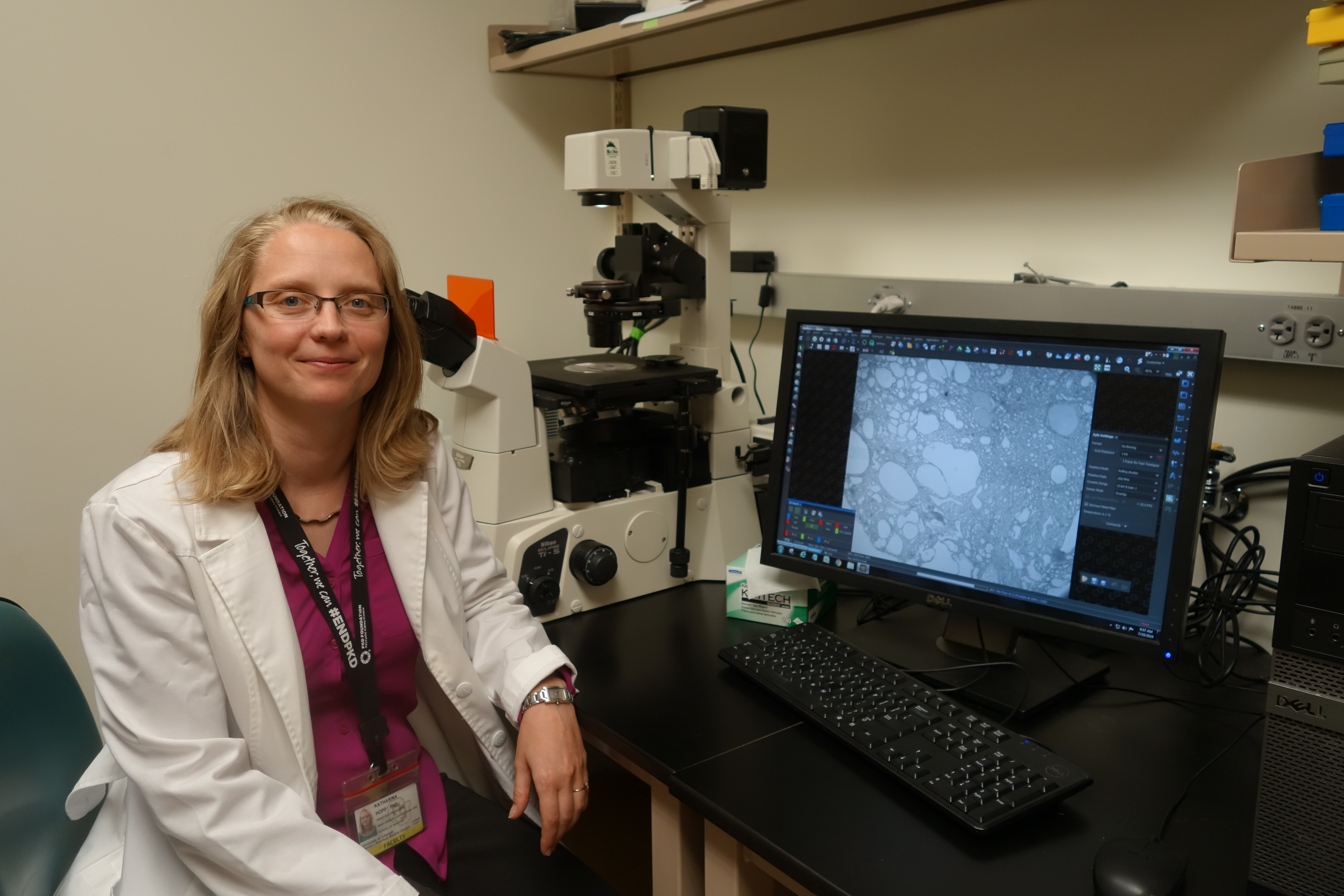
Researcher: Katharina Hopp, Ph.D. | University of Colorado Denver | Anschutz Medical Campus
Assistant Professor, Division of Renal Diseases and Hypertension, Polycystic Kidney Disease Research Program
Katharina is a 2018 research grant awardee of the Dr. Vincent H. Gattone Research Award.
PKD Foundation (PKDF): How did you first get involved in PKD research?
Katharina: In the summer of 2007, I did a Summer Undergraduate Research Fellowship at the Mayo Clinic, Rochester, Minnesota, in the laboratory of Dr. Peter C. Harris. Prior to that summer, I was unfamiliar with PKD, but from my undergraduate course work, I developed an interest in molecular genetics. During that summer, Dr. Harris and his research group taught me a lot about the disease and its associated genetics. I was fascinated by how single mutations to PKD1 could drive such phenotypic heterogeneity as seen in ADPKD1 patients.
I finished the summer with a new-found interest in the complex genetics underlying ADPKD. This, together with the excellent mentorship I received at the Mayo Clinic Translational PKD Center, made me decide to join Dr. Harris’ laboratory in the Summer of 2008 as a Ph.D. student.
My Ph.D. research was unique in that it took me full circle — from patient to model system and back to the patient. First, I was involved in identifying a PKD1 missense mutation that seemingly did not cause ADPKD to the same extend as other mutations of its type are known to do. We then mimicked this mutation in a mouse model to understand its mechanism of action. Based on these studies, we were then able to identify many additional mutations that share similar characteristics in other ADPKD families, helping predict their disease course better. This translational work, where I can see my research going from bench-to-bedside, and the multifaceted biological nature of ADPKD got me invested in continuing to study the disease.
PKDF: What would you like the patient community to know about your research?
Katharina: It is known that close communication exists between many cell types within an organ e.g. immune cells and epithelial cells, to maintain organ homeostasis. In cancer, however, it has recently been shown that this communication can be modulated by the tumor cell to stimulate its own growth. Specifically, tumor cells have been shown to re-program immune cells, particularly T cells in the tumor microenvironment, to create an immunosuppressive milieu supportive of tumor progression.
Hence, we are interested in understanding whether, in part, PKD progression is also driven by a cystic microenvironment that is supportive for cysts expansion. Using various mouse models and cellular co-culture systems, we are trying to map how the communication network among immune cells and the cystic epithelium differs in an ADPKD versus healthy kidney with the hypothesis that cystic epithelial cells have adapted to modulate their cross-talk with immune cells to create an immunosuppressive environment supportive of cyst expansion.
Particularly, we are focusing on how T cell function is being modulated within the cystic microenvironment as in the cancer field it has been shown that tumor cells have developed multiple molecular and cellular mechanisms to suppress this particular cell type, allowing the tumor to evade the immune system surveillance.
PKDF: What are you working on currently?
Katharina: With my faculty recruitment to the Univeristy of Colorado Denver by Dr. Michel Chonchol, Division Chair at the Univeristy of Colorado Denver, I wanted to continue translational ADPKD research, but was aiming to shift gears in order to establish my own research niche. Fortuitously, I teamed up with Dr. Raphael Nemenoff, Professor at the University of Colorado Denver, an expert in cancer immunology, which allowed us to start a new ADPKD research avenue. Our research focuses on understanding how the interplay between immune cells within the cystic microenvironment and renal epithelial cells may contribute to PKD progression.
PKDF: Do you have a personal connection to PKD?
Katharina: While I do not have a personal connection to PKD in terms of family history, I have met and made friendships with PKD patients throughout my years of studying the disease, which made me more invested in my research. Furthermore, while it’s been only 12 years since I started my PKD research journey, my commitment to the disease goes far beyond my work. Thinking about possible key pathomechanism that could be targeted as a potential treatment has become part of my everyday life.
PKDF: What excites you most about this research?
Katharina: To date, many of the clinical and pre-clinical therapeutic approaches to halt cyst progression focus on aberrant cellular pathways within the cystic epithelium. Studying pathways beyond the cystic epithelium that may contribute to the disease would allow a combination treatment approach that may be better tolerated by patients and more effective in slowing PKD progression.
Further, immunotherapy agents that can correct the immunoevasive milieu created by tumor cells have been developed and are now FDA approved for treatment of multiple cancers. Hence, it seems not too far-fetched that they may be able to be repurposed for PKD, if we find that similar immunosuppressive pathways are activated within the cystic microenvironment.
PKDF: What are some of your personal interests outside of research?
Katharina: I have always been an outdoorsy person. Since moving to Colorado, hiking has become one of my favorite activities. The Colorado sun and the Rocky Mountains are truly a combination that cannot be beaten in terms of relaxation. However, I am also a mother of a 2.5-year-old and 4-month-old boy, so in all honesty, most of my free time is spent keeping them happy and watching them grow.
PKDF: Anything else you’d like to share?
Katharina: To move PKD research forward toward better treatment options and maybe even a cure, continuing research funding through the PKD Foundation to support researchers like me is essential. Hence, donations to the foundation are needed.
An easy way for anybody to support PKD research is AmazonSmile, which is identical to Amazon with the added bonus that the AmazonSmile Foundation will donate 0.5% of the purchase price to the PKD Foundation. So, the next time you, as a patient or researcher, or any of your family members, friends, acquaintances or collaborators shop at Amazon, just encourage them to instead use AmazonSmile and select the PKD Foundation as your charity. It will help #endPKD.
Check out Dr. Hopp’s grant and others funded by PKDF here!
The PKD Foundation is the largest private funder of PKD research in the U.S. Since 1982, we’ve invested close to $50 million in more than 700 research, clinical and scientific grants, fellowships, and scientific meetings. Each year, The Foundation identifies and supports the work of scientists and researcher from around the world who look for ways to treat and eventually cure PKD.
Our vision is to end PKD. Donations help fund necessary research that leads to more effective treatments and ultimately a cure for PKD.









Thank you for the info and all that you do!